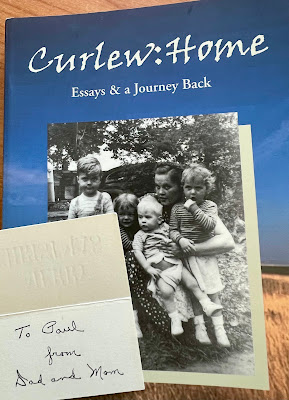(401 pages; dense but worthwhile and I took my time)
As with Kolyma Tales, Solzhenitsyn, etc. - I find so interesting the stories of folks struggling against, or at least to survive, the Soviet regime. This one had all sorts of compelling elements.
The author is the surviving spouse of a Russian poet (Josip Mandelstam) who quickly fell out of favor with the regime, was arrested in 1934, then again in 1937; he died in a transit camp in Siberia (Vladivostok area, perhaps enroute to Kolyma).
A favorite part of the book was her descriptions of the poet's creative process - helps imagine how this might work (since it never happens for/to me!) Josip didn't write down poetry and work on drafts - she would notice when he was concentrating in a certain way, often with lips moving, then eventually he would start writing - not a finished product but very far along - not good to try to interrupt him in this situation.
Some items -
1. Like the linked Kolyma stories - the author uses a spare, unsensational approach to a situation that could support a lot of drama - it's effective.
2. The author and her husband were around through the 1920s so there's a lot of perspective on a decade where I normally haven't seen much. Idealism in the early days. True believers and fellow travelers even then.
3. The idea that the revolution had launched a new era, scientific, inevitable - many liked this idea, or at least big chunks of it. Also Stalin as strong man following difficult-chaotic times (similar appeal for Mussolini, Hitler, perhaps even FDR in a way) - this has a certain popularity.
4. But the totalitarian, terror aspects go from unpleasant "necessity" to dominance. The 1930s - when a car pulling up to a residence, the sound of an elevator coming up - instant fear. Lubianka, black cars, interrogations.
5. Some of it echoes recent US approach (even if ours is comparatively lame). Dismissing ideas as "bourgeois" sounds like recent era of dismissing ideas as "whiteness" (or pick any of the 2010-2024 cancel-words). These words inspire fear, for a while.
6. The poet and the author both work in the world of words, and see how language control is an essential tool of overall control. The progressive left pushes for language control now, areas such as trans, CRT. Endless examples, just saw a Mt Holyoke tweet - faculty are expected to report misgendering. As with Soviets, two elements - take over the language, require reporting.
7. They were closely connected to Anna Akhmatova, another holdout but she survived.
8. Interactions with other famous 20th century Russians - Pasternak, Bulgakov,
9. Author's efforts to save copies of her husband's work. Sometimes using memory for items too dangerous to write down. Handwritten extra copies stored in separate locations, dangerous.
10. Poet got off lucky in 1934, merely banished to live at least 100 kilometers from Moscow. Plenty were in similar straits, making housing difficult to find; they were called "105ers"). Couldn't be published, couldn't get jobs - living in poverty.
11. Author (though not the poet) was around for the famous "thaw" - when Khrushchev denounced Stalin in 1953 - some improvement though short-lived. Still required to speak of the crazy days as historically necessary. Poet was somewhat rehabilitated in this phase.
12. The day-to-day fear - this part hard to imagine - most everyone one encountered was quite probably an informer - especially when younger poetry enthusiasts would show up and exhibit intense interest - they never trusted these folks.
A lot to think about from these awful times.

